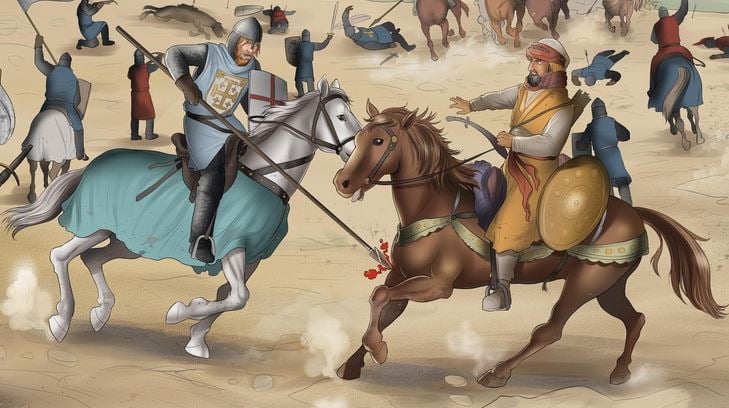Omniscient (all-knowing), punishing Gods have been vital for the evolution of human cooperation and civilization as we know it. Researchers from the University of British Columbia (UCB) and colleagues from the USA, UK, New Zealand, Germany, Denmark and the Czech Republic, suggest that belief in all-knowing Gods who punish those who sin played a major role in expanding cooperation among far-flung peoples.
This cooperation led to the development of western civilization, some other civilisations, and our modern-day states, the researchers explained in the prestigious, peer-reviewed journal Nature (citation below).
The study, involving psychologists and anthropologists, looked at how religions have affected humans’ willingness to cooperate with people outside their social and/or religious circles.
 People who believe in an all-knowing god that punishes wrongdoing are more likely to cooperate with or help other people who believe either in the same god or a similar one, even if they are far away.
People who believe in an all-knowing god that punishes wrongdoing are more likely to cooperate with or help other people who believe either in the same god or a similar one, even if they are far away.
The researchers carried out behavioural experiments with and interviewed almost 600 people from communities in Tanzania, Siberia, Mauritius, Brazil, Fiji and Vanuatu, whose religious beliefs included Hinduism, Buddhism, Christianity, *Animism and ancestor worship.
*Animism is the belief that all things have a soul or spirit, including plants, animals, rivers, mountains, stars, the moon, and the sun.
All-knowing gods encourage human cooperation
Lead author Benjamin Purzycki, a postdoctoral research fellow at the University of Columbia’s Centre for Human Evolution, Cognition and Culture, said:
“Certain kinds of beliefs – involving gods who are aware of human interactions and punish for moral transgressions – can indeed contribute to the evolution of human co-operation.”
“If you think you’re being watched, and expect to be divinely punished for being too greedy or thieving, you might be less inclined to engage in anti-social behavior towards a wider range of people who share those beliefs.”
According to study results, believers in omniscient gods who punish for wrongdoing (sins) are more likely to behave fairly towards distant, anonymous ‘co-religionists’ – those who might not belong to the same religious organisation but share beliefs about gods and rituals.
 Modern civilisation has been built on human cooperation, which has been facilitated by a shared belief in an omniscient and punishing god, the authors believe.
Modern civilisation has been built on human cooperation, which has been facilitated by a shared belief in an omniscient and punishing god, the authors believe.
When individuals act this way, the authors suggest, they are engaging in behaviour that can support major features of modern-day societies, such as large cooperative institutions, markets, partnerships and trade.
Dr. Purzycki said:
“Religious beliefs may have been one of the major contributing factors in the development and stability of highly complex social organizations, such as states.”
Study details
The researchers interviewed participants, who also played two games that involved the distribution of coins to co-participants or other believers based on distant or local communities.
In these games, the volunteers had to use dice to determine who would get the coins. However, as anonymous players, they could bypass the dice and give coins to whomever they wanted to.
The study found that in both games, participants were more likely to comply with the rules and give out more coins to distant believers if they claimed that their gods knew about everybody’s behaviours and thoughts, and punished wrongdoing.
Is the test too limited?
Some people might wonder whether a short-term test involving a limited number of people can explain what happened over vast areas of the world spanning thousands of years. Does it take into account how many people died in the name of omniscient, punishing gods, as occurred during the Spanish Inquisition?
 An artist’s depiction of a battle during the Holy Crusades. Did the study factor in the contribution of religious wars towards the creation of modern civilisation. Did they have a positive or negative effect on our evolution?
An artist’s depiction of a battle during the Holy Crusades. Did the study factor in the contribution of religious wars towards the creation of modern civilisation. Did they have a positive or negative effect on our evolution?
Others may point to how the Roman Empire fared – a vast civilisation which was light-years ahead of any other in the world at the time – after the Roman Catholic Church was established.
How much destruction and loss of human life resulted from the Holy Wars, where armies of people of one religion fought armies of people of another religion – both believing in an all-knowing, punishing god?
To name but a few, there were the Muslim conquests of the 7th and 8th centuries, the Christian Crusades of the 11th and 13th centuries, and the Wars of Religion (16th & 17th centuries).
Then more recently, there have been the conflicts between Catholics and Protestants in Northern Ireland, the wars in the Middle East, and terrorist attacks in western nations.
In an Abstract in the journal, the authors wrote:
“Our results support the hypothesis that beliefs in moralistic, punitive and knowing gods increase impartial behaviour towards distant co-religionists, and therefore can contribute to the expansion of prosociality.”
Citation: “Moralistic gods, supernatural punishment and the expansion of human sociality,” Aiyana K. Willard, Dimitris Xygalatas, Benjamin Grant Purzycki, Coren Apicella, Quentin D. Atkinson, Emma Cohen, Rita Anne McNamara, Joseph Henrich & Ara Norenzayan. Nature. 10 February, 2016. DOI: 10.1038/nature16980.
